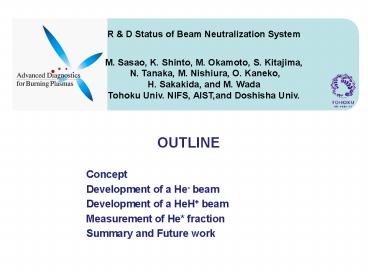beam - PowerPoint PPT Presentation
1 / 16
Title: beam
1
R D Status of Beam Neutralization SystemM.
Sasao, K. Shinto, M. Okamoto, S. Kitajima, N.
Tanaka, M. Nishiura, O. Kaneko, H. Sakakida, and
M. WadaTohoku Univ. NIFS, AIST,and Doshisha Univ.
- OUTLINE
- Concept
- Development of a He- beam
- Development of a HeH beam
- Measurement of He fraction
- Summary and Future work
2
Concept of a He- beam
- Typical Beam parameter
- He0, from auto-detached He-,
- 10 mA, 5cm x 20cm, 0.1 mA/cm2
- Accelerated up to 1.5-1.8 MeV
- He0 in the ground state
He He0 gt He0 He
RFQ HV stage (above) 1m x 1m ? 1m x 1m x 3m
Measuring point
Detection point
3
Development of a He- beam (1) M. Sasao, K.
Shinto, et al.
Milestones
- Pencil beam system for POP
- Optimization of He beam
- Characterization of beams
- Optimization of Alkali gas cell
- Phase space change by charge exchange cell
- Optimaization of Beam optics
- Measurement of metastable fraction
- Full Size He source
- Test at NIFS NBI test stand
- SDS(System Design Study) for ITER
He-,He0 He
10 mA He
10 ?A He-
Tohoku Univ. He- Test System
4
Development of a He- beam (2) Pencil beam
system for POP
???????(??????)
He????
?????
??????????
- ?????????????????(100-200kV)
5
Development of a He- beam (3) Full Size model
???????(??????)
He????
?????
??????????
- ?????????????????(100-200kV)
6
Concept of a HeH beam
- Typical Beam parameter
- He0, from a HeH,
- 20 mA, 5cm x 20cm, 0.2 mA/cm2
- Accelerated up to 1.5-1.8 MeV
- He0 in the ground state
RFQ HV stage (above) 1m x 1m ? 1m x 1m x 3m
Measuring point
Detection point
7
Development of a HeH beam H. Sakakida, et al.
The conditions producing HeH beam were not
investigated in detail as yet. Therefore, the
optimum conditions to extract HeH beam have been
explored using our beam system. In order to
measure beam species, mass spectrometer, whose
energy range is limited less than 500 eV, is
used. Therefore, DC power supply of 300 V is used
for the beam acceleration (here, -4.5 kV is
applied to the deceleration electrode for
efficient beam extraction). Figure shows the
number of HeH, He and H ions as a function of
He gas pressure ratio to the total gas pressure
of the mixture gas (He and H2) in the case of low
energy 300 eV and 6 A beam. It is clear that the
production rate of HeH increases, when He
pressure ratio is larger than 75 . In the case
of 90 ratio, the number of HeH particles
corresponds to 15 of total counts for HeH,
He and H ions.
In the case of high energy 25 keV beam, if 15
of the total current of 40 A, (which includes H,
H2, H3, He and HeH components) is the HeH
component, the current density of HeH is 13
mA/cm2, which is sufficient for the primary beam
in the measurement of ITER.
8
Measurement of He fraction M. Okamoto
9
Summary and crucial issues
- Development of a He- beam is on going in 3
sub-groups in parallel, - 1 Pencil beam system for Proof Of
Principle - 2 Full Size He source
- 3 System Design Study for ITER
- The option of a HeH source is promising as an
alternative probing beam. - Several measurement methods of He fraction are
proposed and their principles will be tested.
10
Summary and crucial issues
- Development of a He- beam is on going in 3
sub-groups in parallel, 1 Pencil beam system
for POP - 2 Full Size He source
- 3 System Design Study for ITER
- The option of a HeH source is promising as an
alternative probing beam. - Several measurement methods of He fraction are
proposed and their principles will be tested. - It is crutial to keep a tangential port at 6.
- Is it possible to send the argument- from
diagnostic point of veiw? - (although 99 is on the current drive, and
blanket test.) - Example
- Various important phenomena which should be
studied on ITER require 2D imaging. - A tangential port can be used for various 2D
imaging (X-ray, VUV, visible, bolometric,
neutrons, gammas, etc.), in addition to the beam
alpha-particle diagnostics.
11
Summary and Future work
- It is crutial to keep a tangential port at 6. -
12
(No Transcript)
13
Conclusion
14
Conclusion
15
Conclusion
16
Conclusion































